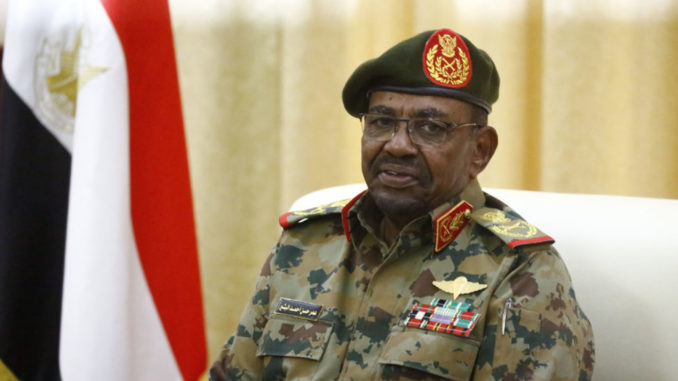
In an apparent extension of the Arab Spring dubbed by some observers as Arab Spring 2.0, Sudan’s long time ruler, President Omar al-Bashir was deposed by the military the other day in the same manner he came into power in 1989. This development followed prolonged protest by the population over rising cost of living and authoritarian policies of the government.
It would be recalled that president al-Bashir rose to power through a coup d’état 30 years ago and remained in power through a combination of authoritarian tactics and opaque elections with a repercussion of deposition from the pinnacle of power. His ouster dovetails into the wave of regime change in the Arab-north Africa spanning Tunisia, Egypt, Libya and recently Algeria, though a curious mix of illiberal democratic processes.
The points at issue in the political development in Sudan and central to the ousting of al-Bashir’s government were the shortages of food and fuel that spiked the price of bread. Fava beans or fuul, a staple, was short in supply and expensive. This economic hardship is a result of international financial institutions (IFIs) policies of restoring macro-economic stability adopted by the Khartoum ruling elite. Along a familiar pattern in the developing countries, subsidies were removed in a range of austerity measures that included currency devaluation.
As at December of last year, it cost 76 Sudanese pounds to buy $1 in the black market and the annual inflation rate stood at about 68% in November above a year old level of 25% previously. The economic profile was also not helped by the exit of South Sudan in 2005 with its oil resources and the subsisting United States sanctions partly eased in 2017. Predictably, these led to protests by the impoverished population who demanded courageously and resiliently for a regime change. The climax was the ouster of the government of al-Bashir.
Although the military intervened, the intrusion has yet to resolve the power question where sovereignty should lie at this moment of transition. General Awad Ibn Auf, the country’s vice president and defence minister who led the coup had announced that, “The armed forces will take power with the representation of the people to pave way for the Sudanese people to live in dignity.” Characteristic of the military, it suspended the 2005 Constitution and declared a three-month state of emergency. This did not impress the protesters who are currently demanding “a civilian council, parliament and government.”
The protesters have held out demanding civil control of the military-led transition government. There have been attempts by troops to clear the protesters. But the protesters are demanding a quicker move to civilian rule in Sudan than the military’s announced two-year transition to an elected government. This persistence has so far led to a leadership shuffle. Both General Auf and the head of the national intelligence have resigned from the provisional government paving way for the emergence of General Abdel Fattah Abdelrahman Burhan. But the leadership of the protest movement is insisting on a civilian council having representatives of the army. Sadly, the talks with the generals have been deadlocked.
While the representation of power remains problematic, the international community is also ambivalent. The AU’s Peace and Security Council (PSC) said in a statement that if the junta failed to hand over power to civilians within 15 days, the AU would suspend “the participation of the Sudan in all AU’s activities until the restoration of constitutional order.” Insisting that, “a military-led transition would be completely contrary to the aspirations of the people of Sudan.” On their part, China, Russia, Saudi Arabia and the UAE favour the stability of a military council while the Western alliance led by United States want a move towards democracy.
Before the struggle of the Sudanese people is checkmated on the altar of international politics, the point must be made that sovereignty belongs to the people and is at the core of social contract. Institutions of states such as the military must subordinate itself to the will of the people and allow democracy to flourish. And a quick transition to democratic order through the ballot box is non-negotiable.
However, the fall of al-Bashir coming on the heels of the forced exit of Algerian President, Abdelaziz Bouteflika as a result of the agitation of the people against misrule and tenacity in office should pass a clear message to sit-tight leaders in Africa. Dictators like Cameroon’s Paul Biya who has spent 30 years in power; Equatorial Guinea’s Teodoro Obiang Nguema, 39 years in office and Uganda’s Yoweri Museveni now 33 years in power should chart ways for a smooth change of leadership. Truly, sit-tightism has lost traction and adds no value to the governance process. But alternation in power allows for national renewal and socio-political stability.
In the main, it should be noted that al-Bashir perpetrated a great deal of human rights violations in his country. In the protest that led to his ouster, Amnesty International put the number of the dead at 37. While in power, he was accused of war crimes in the Darfur conflict in which hundreds of thousands of people were killed. Indeed, the International Criminal Court (ICC) indicted Mr. Bashir on charges of crimes against humanity and genocide years ago. He must indeed account for his stewardship of the Sudanese state. But the conclusion of the whole matter is that the military should not delay democratization process in Sudan a day longer than necessary. The will of the people should be supreme at this time.
END

Be the first to comment